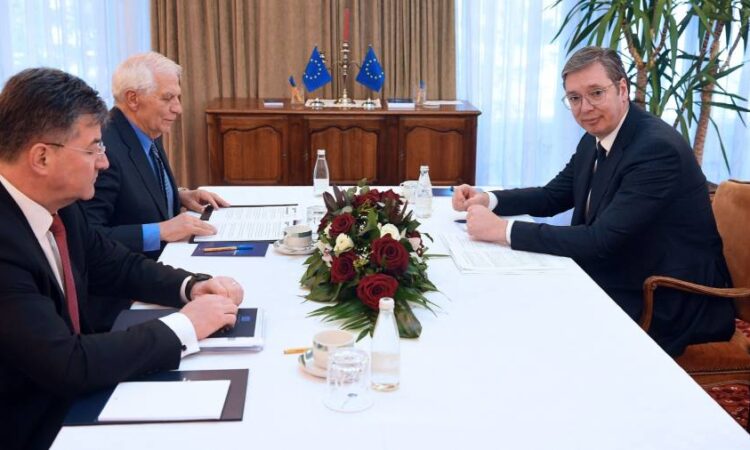
Serbia and Kosovo have agreed to implement an EU plan to resolve a decades-long dispute that has simmered since Kosovo’s 2008 declaration of independence in the wake of the Balkans wars.
The deal was announced late on Saturday by EU foreign policy chief Josep Borrell, after 12 hours of talks between the Serbian president and the Kosovo prime minister on normalising ties between their countries.
“Finally,” Borrell said, speaking from the North Macedonian resort of Ohrid where Serbia’s Aleksandar Vučić and Kosovo’s Albin Kurti met, “we have a deal, we have an agreement on how to do it.”
Serbia has long refused to recognise its former province as independent — a view shared by most of the ethnic Serb community living in the north of Kosovo, thousands of whom still use Serbian ID cards and drive cars with Serbian licence plates.
But with both Serbia and Kosovo seeking to join the EU, efforts to reach a settlement have been stepped up.

Western pressure for the two sides to resolve their differences intensified as the war in Ukraine entered its second year and fears of potential instability in the Balkans region grew.
“This is not just about Kosovo and Serbia,” Borrell said. “This dialogue must be seen in the current broader geopolitical context, as an important tool to maintain peace and stability in the broader western Balkans region.”
An agreement between Belgrade and Pristina was initially reached last month but without a mutually acceptable plan to put it into practice. That second document was thrashed out on Saturday, although once again it was not signed.
Borrell said the deal had been watered down from a more ambitious version which Kosovo would not accept. Serbia also refused to sign the agreement, although it was willing to implement it.
Kosovo has agreed to “immediately” set up an association of Serb majority municipalities, a move long demanded by Serbs in Kosovo.
Serbia, meanwhile, said it would “not object to Kosovo’s membership of any international organisation”. Although Saturday’s agreement does not say so explicitly, this means Kosovo may become a member of the UN, its historic ambition.
Vučić warned of a difficult path ahead. “It wasn’t D-Day, but it was an OK day,” the Serbian president said. “We made a good move in a constructive atmosphere. We have started to act.”
Kurti called it a “public agreement”, adding that it was “up to the EU to find the mechanism to make the status of this agreement legally and internationally binding”.
The EU will make implementation of the Kosovo-Serbia agreement a condition for the eventual accession of both countries. Borrell said “there will be consequences” if the sides fail to follow through on their commitments.
The EU will convene a donor conference later this year for the benefit of Kosovo and Serbia, withholding any funds until the agreement is complete and fully implemented.






